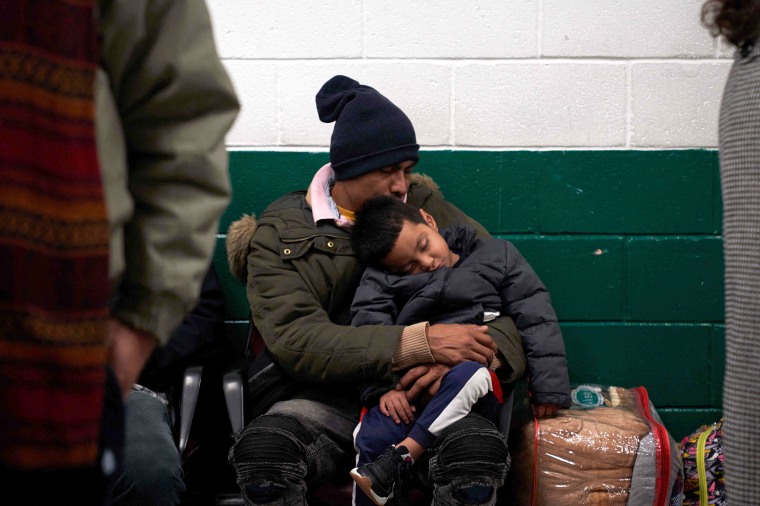EL PASO, Texas — The nation began readying for an arctic storm that could plunge temperatures around the country, but on the southern border many migrants say they didn't know they were in for colder, nastier weather.
Grisleida, who migrated from Venezuela and declined to give her last name, waited on the sidewalk with her young children, ages 8 and 6, near the Greyhound station. She crossed the border Monday with her husband, but he has been deported to Mexico.
She has been sleeping at a shelter where she tries to arrive early each evening to get a spot inside. She has no money or cellphone or any other way of communicating with her husband.
El Paso's forecast calls for temperatures dropping to the low 20s Thursday.
"I didn't know about the cold," she told NBC News when asked her plans for the approaching colder weather. She and her children wore light winter clothes.
The snow, wind and other winter conditions likely to be felt more in other parts of the state and country were threatening to delay flights at major airline hubs and make driving treacherous.
Officials have been trying to get migrants to other cities with more shelter capacity and resources to feed the asylum-seekers as they try to arrange travel to final destinations where family and friends are.
In the midst of the weather warnings, El Paso Mayor Oscar Leeser said the city was trying to open up shelters in vacant schools and the convention center in the next couple of days.
The city was able to open up the convention center Monday night and about 200 people stayed overnight, city spokeswoman Laura Cruz-Acosta said in an email Thursday.
El Paso officials have been using city buses to pick up migrants who have been sleeping outside in 20- or 30-degree temperatures and taking them to a shelter or hotel. Some want to stay on the street because they are waiting for buses out of town, Leeser said.
State and local officials said in a statement Wednesday that they had taken in 3,854 people seeking asylum and moved them to shelters.
Moisés Vásquez is among the migrants who has been sleeping on a sidewalk near the bus station. Originally from Cuba, he left his country in 2018 and ended up in Uruguay, where he worked three and a half years to earn enough money to come to the U.S. He left Uruguay June 2 and walked to the border.
He hopes to go to Georgia or Virginia to work; his goal is to bring his children to live with him so they don’t have to stay in Cuba.
“I want to have a tranquil life and bring my family,” he told MSNBC and NBC News anchor José Díaz-Balart. Vásquez also was not aware of the winter storm. He has been sleeping under blankets for several nights.
Texas' power grid failed in a freeze in 2021, killing more than 200 who were left without power. In a news conference Wednesday, Gov. Abbott reassured the state that the power grid would stay online this time.
Piles of sweaters, coats and other clothing had been assembled at the Greyhound bus station to help migrants endure the frigid temperatures. Random El Paso residents also brought by food and clothes to migrants.
Marvin, 32, who came with his sister from Nicaragua and did not want to provide his last name, found refuge in the home of a local woman who opened her home to them Tuesday night. He had no money for a bus ticket and was waiting on a friend in Miami to wire him some. But he had no cellphone, making that difficult.
After the National Guard and state troopers erected razor-wire barricades along the Rio Grande Tuesday, those trying to cross moved to another section of the border less than a mile away and gathered there. Some were allowed entry late Tuesday. By Wednesday morning, hundreds more had replaced the previous group.
Migrants allowed into the U.S. are processed by Border Patrol and many are expelled. But thousands of others are allowed in to seek asylum, particularly those from countries that won’t take them back.
The show of force by the Texas National Guard and state troopers angered some residents. Fernando García, Border Network for Human Rights executive director, said in a statement that the presence of the Guard and DPS troopers feeds racist, xenophobic and white supremacist rhetoric of an invasion on the border.
Before the Aug. 3, 2019 shooting massacre at a Walmart in El Paso -- which left 23 dead and 26 wounded -- an anti-immigrant, anti-Hispanic document that mentioned a Hispanic invasion of Texas appeared online.
The Department of Homeland Security said Tuesday it had expelled 3,400 people to Mexico or put them on Immigration and Customs Enforcement flights out of the country. They’ve sent 6,000 to other Border Patrol sectors for enforcement proceedings there.
Average daily encounters with migrants on the entire southern border have dropped by 40% from 2,500 a day to 1,500 over the last three days, DHS said.
The U.S. has been using a health law, Title 42, rather than immigration law, Title 8, to expel millions of migrants more quickly from the country. It was due to expire Wednesday but is now temporarily on hold on order from Supreme Court Justice John Roberts.
Ruben García, director of Annunciation House, which provides shelter for migrants, said the focus needs to be on “hospitality capacity” in El Paso and elsewhere.
“It’s very important for people to understand this is not an El Paso need, this is a borderwide need,” he said.
Andrés González, Guad Venegas and Julia Ainsley reported from El Paso, Texas and Suzanne Gamboa reported from San Antonio.


